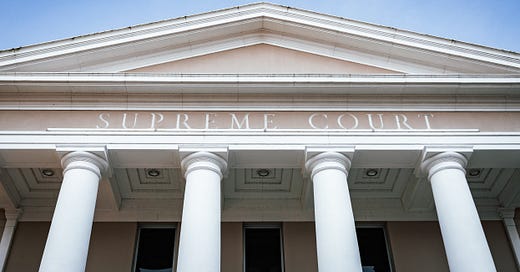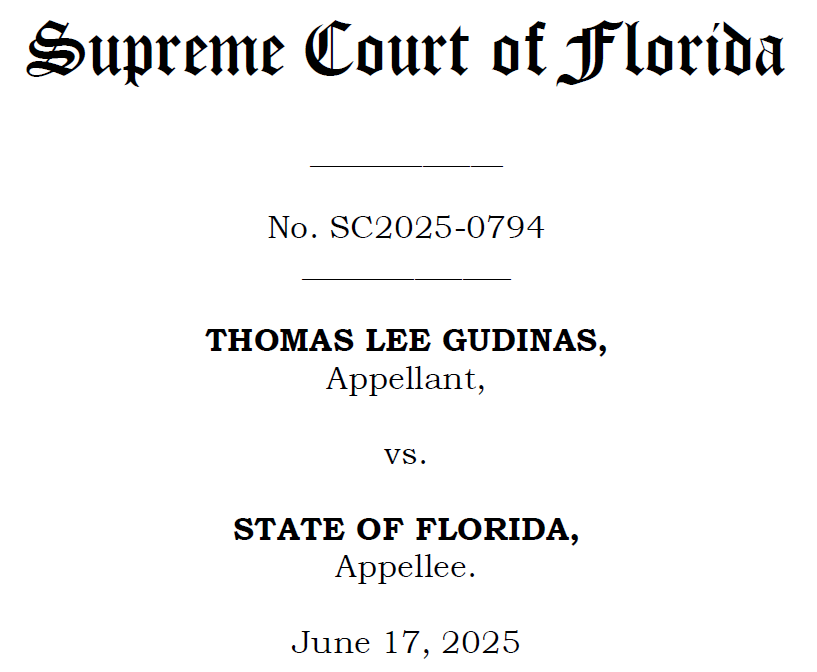GUDINAS WARRANT: Florida Supreme Court denies claims
Thomas Gudinas’s execution is scheduled for June 24. Today, the Florida Supreme Court issued an opinion affirming the circuit court's denial of Gudinas's claims.
Thomas Gudinas’s execution is scheduled for June 24 at 6:00 p.m. Today, the Florida Supreme Court issued an opinion affirming the circuit court’s denial of Gudinas's claims.
On Tuesday last week, the State filed its Answer Brief. On Wednesday, Gudinas filed his Reply Brief.
Today, the Court issued a 34-page per curiam opinion affirming the circuit court’s summary denial of Gudinas’s claims and denying Gudinas’s motion for a stay of execution.
On Gudinas’s first claim of newly discovered evidence related to his “lifelong mental illnesses,” which he claims “place him outside the class of individuals who should be put to death,” the Court states that it “cannot determine what exactly it is that Gudinas believes is newly discovered” because of the terminology used in the briefing. Nevertheless, the Court determined that even assuming the information is newly discovered, Gudinas has not shown that it “is of such a nature that it would probably produce a life sentence on retrial.” The Court clarified that, contrary to Gudinas’s arguments, “[n]either clemency proceedings nor the signing of his death warrant has anything to do with the timeliness of Gudinas’s claim that he is exempt from execution under the Eighth Amendment.” The Court further held that the circuit court correctly concluded that the claim is procedurally barred because a variation of the claim has been raised before.
Notwithstanding, the Court further determined that Gudinas’s claim lacks merit. The Court reiterated that Atkins, which “shields the intellectually disabled from execution does not apply to individuals with other forms of mental illness or brain damage.” The Court also stated that it has “repeatedly rejected the argument that “Roper’s categorical ban on the execution of individuals who were” under the age of 18 at the time of the crime “should be extended to defendants whose chronological age was over eighteen at the time” of their crime. Interestingly, the Court states: “Unlike many of the defendants in the cases cited by Gudinas, Gudinas does not allege that his mental or developmental age was under eighteen at the time of the murder; he simply argues that Roper’s protections should be extended to him based on his chronological age of twenty at the time of the murder in this case.” Even still, the Court denied the argument in Ford’s case earlier this year that a mental age can justify Roper protection. Further, the Court said that it “lacks the authority to extend Atkins or Roper under the conformity clause in the Florida Constitution related to the Eighth Amendment.
On Gudinas’s second claim that the conformity clause in the Florida Constitution is unconstitutional, the Court determined that “[t]he circuit court properly determined this claim to be procedurally barred and meritless.” The Court’s reasoning here was a bit circular:
Gudinas has also failed to show how the conformity clause in article I, section 17 violates his federal constitutional rights. While the states are required to adhere to the Supreme Court’s Eighth Amendment jurisprudence, neither the Eighth nor Fourteenth Amendments require states to expand the protections afforded by the Eighth Amendment or to interpret their own corresponding state constitutional prohibitions against cruel and unusual punishment in a more expansive manner than the Supreme Court has interpreted the federal prohibition.
Gudinas’s assertion that Florida’s adherence to the conformity clause in article I, section 17 has denied him access to the courts is baseless. Even the fact that this claim is now procedurally barred does not violate his access to the courts or his right to be heard at the appropriate time and in accordance with the laws and procedural rules of this state.
Finally, the Court denied Gudinas’s claim that the time limitations in Rule 3.851(d)(2) are unconstitutional, saying the Court just addressed this same issue in Ford: “Like Ford, Gudinas has not been denied an opportunity to bring his claims before the courts and to be heard at the appropriate time(s) and through the appropriate channel(s).”
As to Gudinas’s appeal of the circuit court’s denial of his demand for public records, the Court determined the circuit court did not abuse its discretion. The Court reiterated that documents related to the clemency process are exempt from disclosure.
Justice Labarga concurred in result without a separate opinion.
All of the filings, including the Court’s opinion from today, can be found on the Court’s docket here.
TFDP Prior Coverage of the Gudinas Warrant
My thoughts are with everyone involved in the warrant- and execution-related process.




